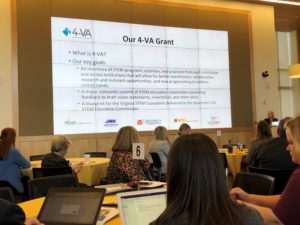 More than 140 leaders from Virginia’s K-12 and higher education institutions, out-of-school providers, the private and business sectors, and state officials and institutions joined together recently to begin the work of developing a blueprint for a statewide STEM network. This structure will be the basis for creating cross sector pedagogies providing Virginia’s youth access to a learning environment which will allow them to grow important skills to engage in science, technology, engineering, and mathematics from PreK – 16. “Virginia’s STEM Summit” was hosted by Virginia Commonwealth University and sponsored through a grant from 4-VA. The project was developed by a group 4-VA schools – VCU, Virginia Tech, George Mason, James Madison, and University of Virginia in coordination with the Virginia Department of Education and the Office of the Governor.
More than 140 leaders from Virginia’s K-12 and higher education institutions, out-of-school providers, the private and business sectors, and state officials and institutions joined together recently to begin the work of developing a blueprint for a statewide STEM network. This structure will be the basis for creating cross sector pedagogies providing Virginia’s youth access to a learning environment which will allow them to grow important skills to engage in science, technology, engineering, and mathematics from PreK – 16. “Virginia’s STEM Summit” was hosted by Virginia Commonwealth University and sponsored through a grant from 4-VA. The project was developed by a group 4-VA schools – VCU, Virginia Tech, George Mason, James Madison, and University of Virginia in coordination with the Virginia Department of Education and the Office of the Governor.
Governor Ralph Northam has charged Virginia’s STEM leaders with the job of creating an infrastructure, with input from all stakeholders, for the newly-appointed Virginia STEM Education Commission. The strategic plan is due next year.
As 4-VA grant team member and Associate Director of the Center for Educational Networks and Impacts at Virginia Tech Susan Magliaro, explained, “Our goal today is to provide a well woven tapestry of information from our STEM leaders.”
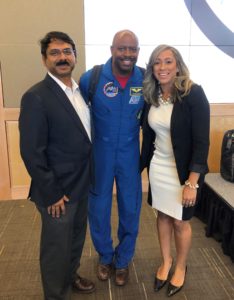
The day-long conference began with a keynote address from retired NASA astronaut, materials science engineer, educator, and former NFL wide receiver Leland Melvin. Melvin shared with the audience how STEM education necessitates an open mind, perseverance, and personal support in order to be successful. George Mason University’s PI on the project, Dr. Padmanabhan Seshaiyer noted, “Leland was the perfect kick-off for our conference. He clearly illustrated that STEM doesn’t have to be stuffy or difficult to understand, it’s a hands-on experiential learning opportunity which can open doors for all of our students, and especially our minority or underserved students. It can bring projects and process to life.”
Other Mason participants in this 4-VA summit included members with diverse backgrounds and expertise in STEM including Dr. Rebecca Jones, Ms. Kelly Knight, Dr. Karen Lee, Dr. Kammy Sanghera and Ms. Kerin Hilker-Balkissoon.
The conference also included a panel discussion addressing some of the more difficult obstacles to overcome while implementing STEM programs, presented by a range of leaders from the business, education and policy arenas. Each highlighted best practices developed by state or local school boards from around the country. The consensus was that successful existing ecosystems in STEM were developed by building a culture which welcomed all stakeholders, and where the resulting guidelines represented a convergence of values and practices.
Following the panel discussions, attendees joined together to hammer out the framework for such ecosystems based on their professional backgrounds.
Longtime STEM proponent Amy Sabarre, Director of STEM Education for the Harrisonburg City Schools, observed, “I’ve been involved with the development of a core curriculum for STEM in the Commonwealth for years, and this Summit has been a long time coming. But, we’re here now, and we’re making great strides.”
Concurrently, newer stakeholders see the same bright future. Says Makerspace coordinator at William and Mary, Jonathan Frey, “Makerspaces have been growing and evolving at a dramatic pace throughout the world. What was once a location for tinkerers to play with technology has now become an impactful community engineering center both in academia and the private sector. Here in the Commonwealth there are dozens of makerspaces and it’s time to coordinate collaboration throughout Virginia. The 4-VA STEM Summit offers an opportunity for introduction and collaboration between such efforts from the peaks of Appalachia to the sands of the eastern shore.”
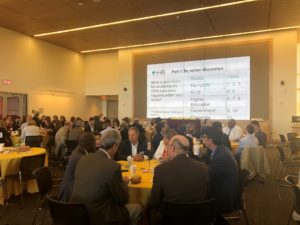 The day concluded with a group effort to integrate the work created at each roundtable into a viable framework for the Commonwealth. The conclusions will provide the basis for the STEM ecosystem build out and will be forwarded to the Virginia’s STEM Education Commission.
The day concluded with a group effort to integrate the work created at each roundtable into a viable framework for the Commonwealth. The conclusions will provide the basis for the STEM ecosystem build out and will be forwarded to the Virginia’s STEM Education Commission.

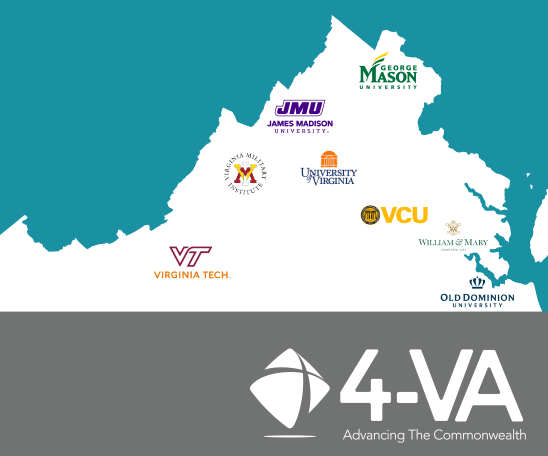
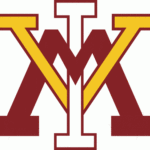 “We are delighted to bring William and Mary and VMI into our 4-VA collaborative,” said 4-VA Mason Campus Coordinator Janette Muir. “The very strength of 4-VA is collaboration. With our additional partners, our students and faculty have more opportunities — that’s great for higher education in the Commonwealth.”
“We are delighted to bring William and Mary and VMI into our 4-VA collaborative,” said 4-VA Mason Campus Coordinator Janette Muir. “The very strength of 4-VA is collaboration. With our additional partners, our students and faculty have more opportunities — that’s great for higher education in the Commonwealth.” of collaboration with our sister institutions.”
of collaboration with our sister institutions.”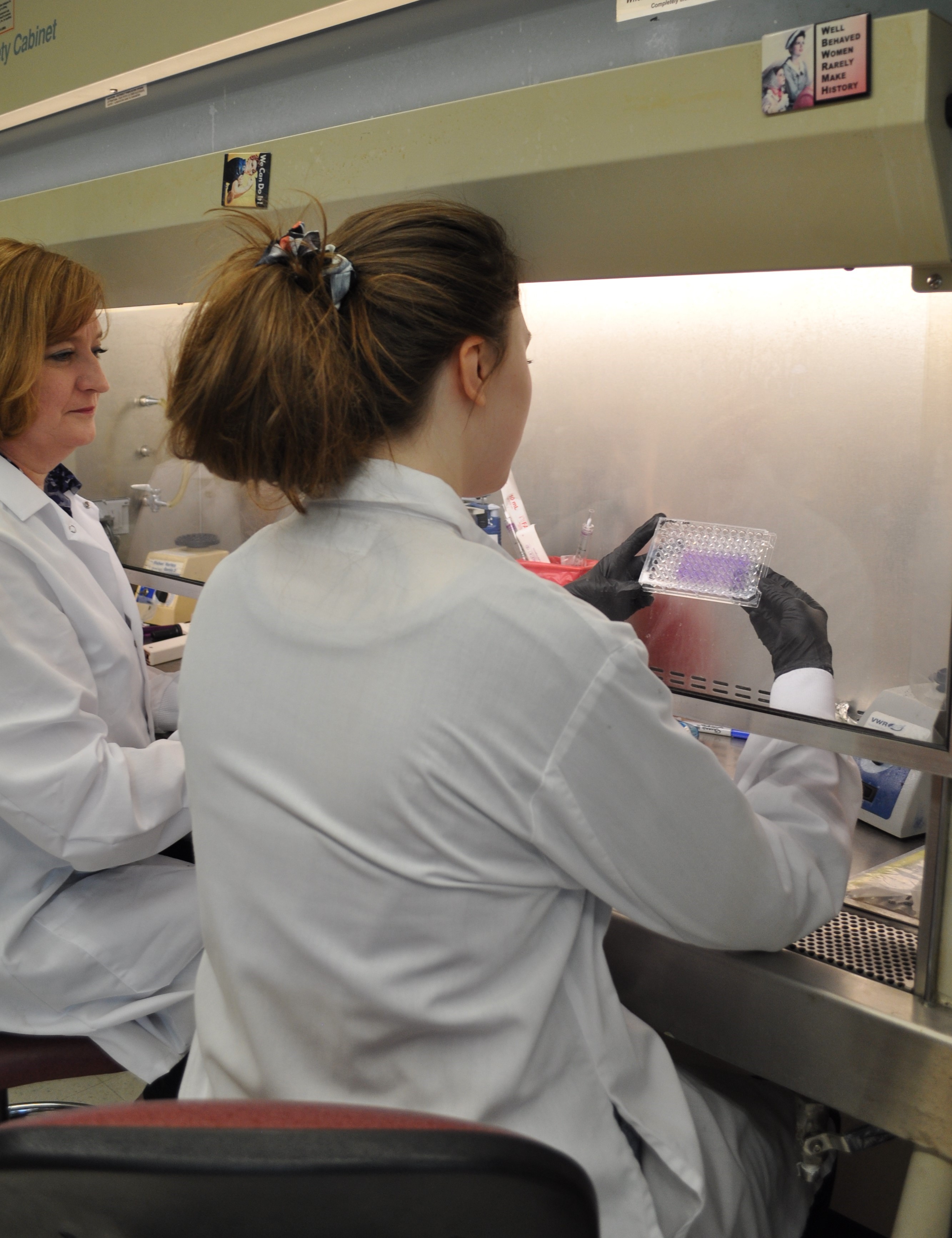
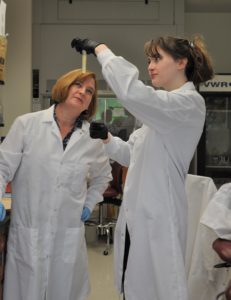
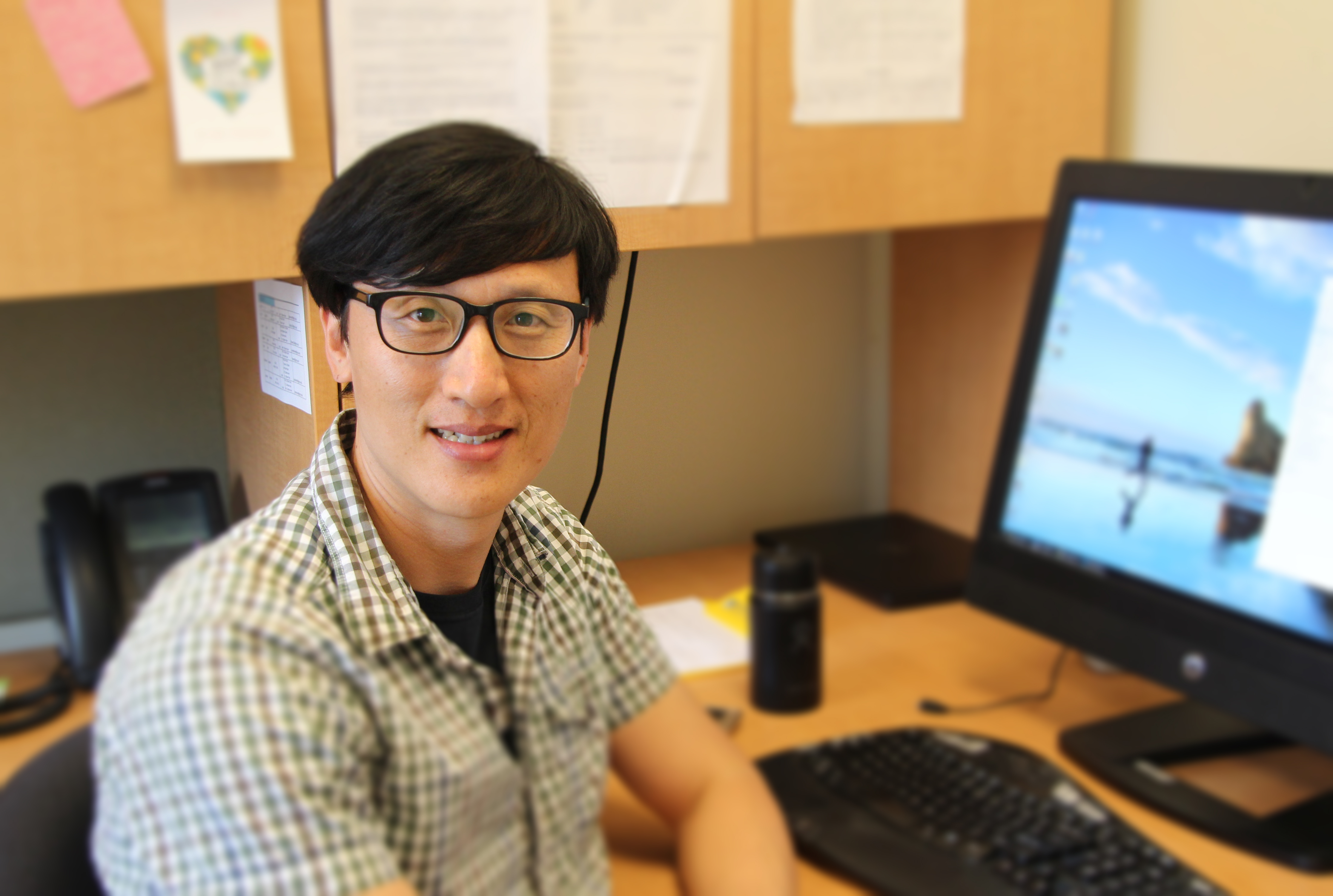
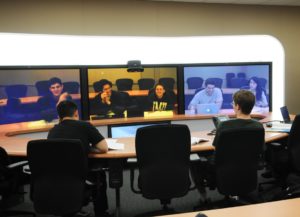 the classroom to make it interesting and challenging,” explains Kim.
the classroom to make it interesting and challenging,” explains Kim. recognizes there is much to be understood about creating constructive introductions in the school setting. However, she is also keenly aware of a key flaw in the data used in the benchmark research – it is predominantly limited to students who are economically advantaged.
recognizes there is much to be understood about creating constructive introductions in the school setting. However, she is also keenly aware of a key flaw in the data used in the benchmark research – it is predominantly limited to students who are economically advantaged.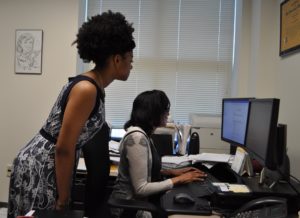 Several months later, with that grant in hand, Garner identified an undergrad student, Tamera Toney, who was interested in the project and would be able to handle some of the data entry and management responsibilities. Toney worked on the project during her senior year at Mason. Garner saw that the 4-VA funding could provide a personal and professional pathway for Toney to enhance her studies. Toney recently graduated and will return in the fall to begin her master’s work in Psychology.
Several months later, with that grant in hand, Garner identified an undergrad student, Tamera Toney, who was interested in the project and would be able to handle some of the data entry and management responsibilities. Toney worked on the project during her senior year at Mason. Garner saw that the 4-VA funding could provide a personal and professional pathway for Toney to enhance her studies. Toney recently graduated and will return in the fall to begin her master’s work in Psychology.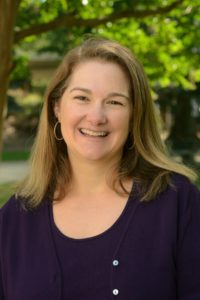
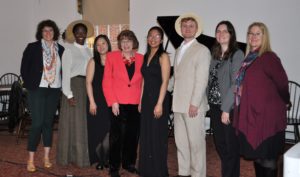
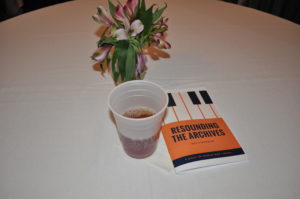 rehearsed and studied the music within its historical context. And similar to good musical composition, RtA worked to a crescendo. For the RtA team, that was a spring evening in Charlottesville when the team of researchers, performers (musicians and singers), videographers and archivists, librarians, faculty and more joined together in UVA’s Colonnade Club Garden Room to fully embrace 17 pieces of WWI music. From “K-K-K Katy” to “Over There” to “Oh How I Hate to Get Up in the Morning” the Colonnade Room sprang to life — circa 1918.
rehearsed and studied the music within its historical context. And similar to good musical composition, RtA worked to a crescendo. For the RtA team, that was a spring evening in Charlottesville when the team of researchers, performers (musicians and singers), videographers and archivists, librarians, faculty and more joined together in UVA’s Colonnade Club Garden Room to fully embrace 17 pieces of WWI music. From “K-K-K Katy” to “Over There” to “Oh How I Hate to Get Up in the Morning” the Colonnade Room sprang to life — circa 1918.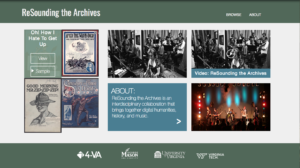
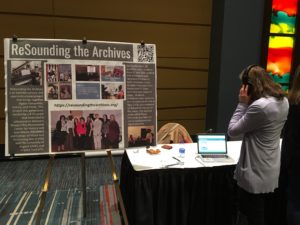
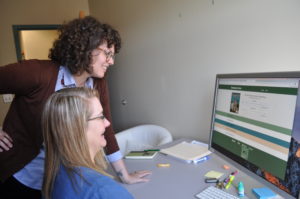
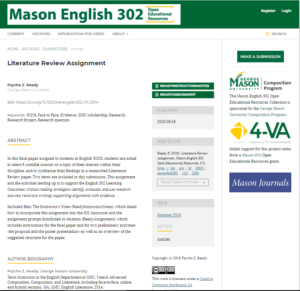 Team member Psyche Z. Ready, assisted by Joyce P. Johnston, took the lead in adapting Mason Journals’ iteration of the Open Journal System (OJS) to meet the needs of English 302 OER collection authors, reviewers, and users. Each item in the new, public-facing collection includes an abstract, instructor’s notes, and creative-commons licensed curricular materials – assignments, activities, and/or background readings – created, adapted, or curated for use in English 302. The OJS platform eases the review process, and also allows user-friendly features such as keyword searching.
Team member Psyche Z. Ready, assisted by Joyce P. Johnston, took the lead in adapting Mason Journals’ iteration of the Open Journal System (OJS) to meet the needs of English 302 OER collection authors, reviewers, and users. Each item in the new, public-facing collection includes an abstract, instructor’s notes, and creative-commons licensed curricular materials – assignments, activities, and/or background readings – created, adapted, or curated for use in English 302. The OJS platform eases the review process, and also allows user-friendly features such as keyword searching. ead PI Moissa Fayissa, PhD. conjectured that this might just be the path for the team to pursue: He believed their current text and lab books were subpar and incomplete as a match for their course. Fayissa saw the need to provide only top-notch materials for this intensive class — which is offered in three sessions in the fall semester and two sessions in the spring semester. Additionally, Fayissa worried about the cost of their then-current textbook. At more than $250, this was a high price to ask students to pay.
ead PI Moissa Fayissa, PhD. conjectured that this might just be the path for the team to pursue: He believed their current text and lab books were subpar and incomplete as a match for their course. Fayissa saw the need to provide only top-notch materials for this intensive class — which is offered in three sessions in the fall semester and two sessions in the spring semester. Additionally, Fayissa worried about the cost of their then-current textbook. At more than $250, this was a high price to ask students to pay. , “The materials search included looking at printed laboratory manuals and online open resources. When we could not find enough information online for the experiment, we referred to the previous laboratory manual and cited the lab manual as the reference. The instructions and background materials found online were rewritten to suit our needs.”
, “The materials search included looking at printed laboratory manuals and online open resources. When we could not find enough information online for the experiment, we referred to the previous laboratory manual and cited the lab manual as the reference. The instructions and background materials found online were rewritten to suit our needs.”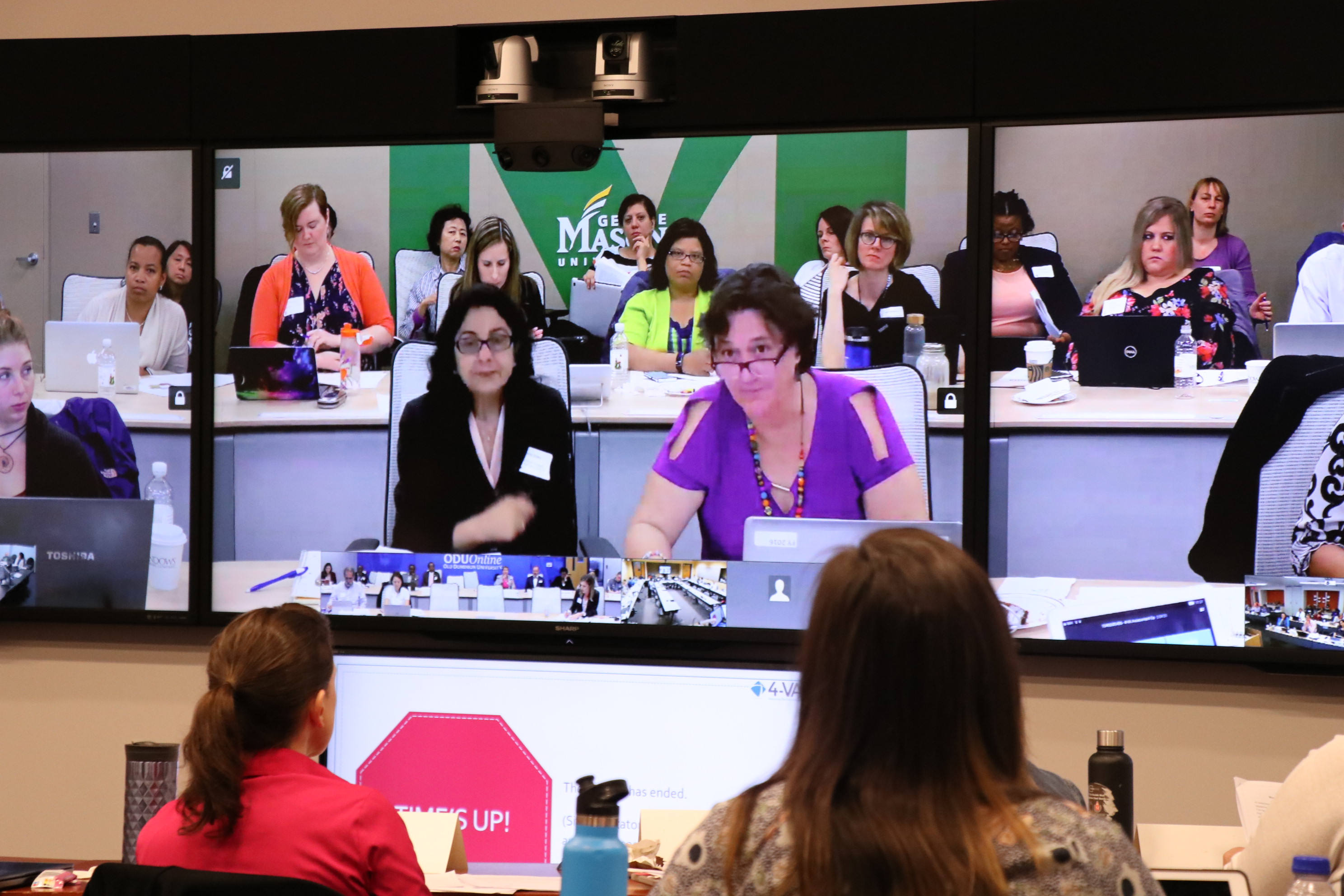
 telepresence technology at each of the 4-VA schools.
telepresence technology at each of the 4-VA schools.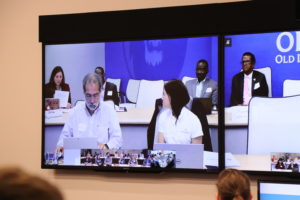 learning and improvement” was an instant success, with 168 conference registrants representing 50 organizations: 31 universities, 15 community colleges, and 4 professional organizations. The event was funded by a 4- VA Collaborative Research Grant and organized by the nonprofit Virginia Assessment Group.
learning and improvement” was an instant success, with 168 conference registrants representing 50 organizations: 31 universities, 15 community colleges, and 4 professional organizations. The event was funded by a 4- VA Collaborative Research Grant and organized by the nonprofit Virginia Assessment Group.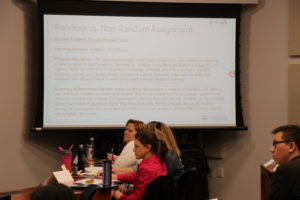 description of the gold standard, randomized control trial, followed by a “let’s get real” section highlighting the real-world data collection challenges that assessment practitioners face. Participants grappled with how to make appropriate inferences from the data collection designs that are possible given common constraints. The morning concluded with participants from each location providing suggestions for ways of dealing with practical challenges related to data collection.
description of the gold standard, randomized control trial, followed by a “let’s get real” section highlighting the real-world data collection challenges that assessment practitioners face. Participants grappled with how to make appropriate inferences from the data collection designs that are possible given common constraints. The morning concluded with participants from each location providing suggestions for ways of dealing with practical challenges related to data collection.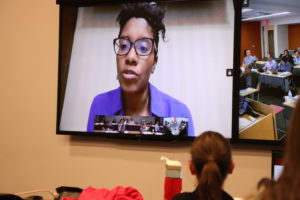 and Gianina Baker (National Institute for Learning Outcomes Assessment – NILOA). Participants viewed a video produced by Jillian Kinzie (NILOA), illustrating examples and rationale for presenting assessment findings that tell the story of student learning. Participants engaged in an activity in which they tailored a data report to a particular stakeholder audience. Gianina Baker closed the afternoon, providing reflections and suggestions for effective evidence-based reporting.
and Gianina Baker (National Institute for Learning Outcomes Assessment – NILOA). Participants viewed a video produced by Jillian Kinzie (NILOA), illustrating examples and rationale for presenting assessment findings that tell the story of student learning. Participants engaged in an activity in which they tailored a data report to a particular stakeholder audience. Gianina Baker closed the afternoon, providing reflections and suggestions for effective evidence-based reporting.